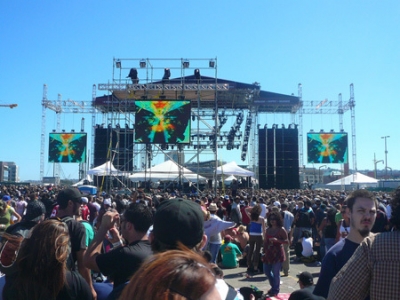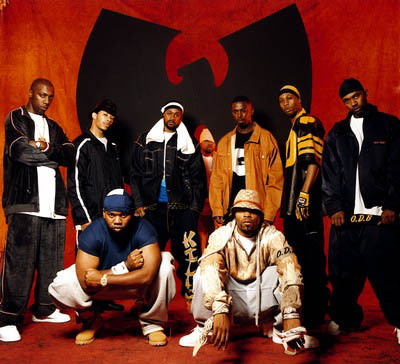
15 + 10 points
Cool Memories by the band-aid bandit
September 4th, 2007 10:58 PM
The morning of Rock the Bells, my friend's MC boyfriend said this is going to be historic. And being the music loser that i am, I asked, "Why?" and his eyes grew large as he listed the hip hop legends that were all going to be performing, all in one event, all in one day. And I was like, "oh."
Rock the Bells (for me) did not happen because 1) I am short (height and temper) and impatient and 2) I wasn't into getting really high or drunk so that I could last hours and hours standing up with the 50,000 people who were in attendance. Ironically the following weekend, I ended up at another big event with 4,000 people in attendance and it had a similar effect on me with parts of the event feeling like they "didn't happen."
Other reasons why (for me) Rock the Bells did not happen as a historical event is as follows:
Rock the Bells for me didn't happen first of all because it is going to happen again and again online. Second, Rock the Bells didn't happen because half the people didn't watch the actual event but watched 50 foot video screens. And third, Rock the Bells as an historical event didn't happen because most of the 50,000 fans attending the event had no "revolution" to "represent" as other bloggers point out, most people who attended Rock the Bells were white, middle class ballers.
Rock the Bells could have been historic if history changed and the crowd was filled with African Americans each who had $70/$151 to spare for tickets plus BART fare :). I didn't have the money, but I spent it anyways and so now I have $0 in the bank and I live in Berkeley/Oakland where there are a lot of black people cause the rent is cheaper and families can sustain themselves.
Not that being white is a bad thing. It's just the Rock the Bells performers (not all but most) speaks to the poor, struggling and silenced sections of society. One blogger writes about getting this realization from a drunk 6'3" chubby-looking Canadian guy. The blogger writes:
"...What changed everything, however, was when a 6'3" chubby-looking Canadian gentleman came up to my friend and I and had a discussion about his inebriation. It was fine until he said, "You know, you're like the 11th Black person I've seen at this event." It didn't bother me; to the contrary, it made me conscious of what I was witnessing. He continued, "You know, it's funny how at an event like this, where there are Black performers performing Black music, almost the whole audience is White."
A writer of the magazine Mass Appeal also notes that the audience at Rock the Bells was an unfamiliar crowd to the performers:
"...it certainly didn’t lack support, but with Rage Against the Machine headlining, part of the crowd better resembled Ozzfest than a rap show. This was more than evident as ‘Tool’ shirts were just as prevalent as clouds of smoke during Cypress Hill’s set. This movement actually proved beneficial to many of the artists, however, as they had the unique opportunity to perform in front of an unfamiliar audience."
and in a NY Times article, the writer notes but does not explain that, "Not coincidentally African-Americans were a tiny minority in the crowd; cargo-shorts wearers most certainly were not...
Although Chang Weisberg, one of the organizers, has called Rock the Bells “a window into the future” of hip-hop culture, on Saturday it seemed more like a time capsule."
Rock the Bells as a time capsule sounds more like it. Rock the Bells was for the nostalgic, the peps who grew up with all these hip hop/rock 90's bands. Rock the Bells was like a flash back, a dream, a fantasy come true - all childhood rock stars on stage for one night. Grouped all in one night, the hip hop stars were here one day and gone the next. And their messages of "Fuck Bush" and "Revolution" passed with the morning Fog.
So now what, reality hits. The same so-called "historic" performances witnessed by the concert goers are now online on You Tube, On bands' websites and myspace pages and on video in the Rock the Bells documentary. The next day, My friend showed me what I didn't miss, the Public Enemy performance, on her digital camera. She had filmed the video screen of Public Enemy's performance, but not Public Enemy's performance itself. What I experienced during the event was the event's traces, not the actual event. I got a mediated pixelated version even though I was standing only a few feet from the actual stage. The traces still echo throughout the net in video, audio, and blog form.
According to dictionary.com, the definition of historic is "belonging to the past; of what is important or famous in the past" - -
1) Rock the Bells lost its importance when it sold out to the mainstream and attracted sponsors who are not about the music but about product placement and attracted paying customers who are entertained by ideas of "rebellion" "revolution" and "the thug life" but will never have to experience any of these ideas personally.
2) Rock the Bells does not belong to the past because it continues on today online over and over again. The event happened differently and continues to happen differently for people at different times. For example, I experienced The Coup's awesome performance of "Kill a CEO" by watching them on You Tube.
Rock the Bells as a historical event didn't happen. Rock the Bells as the tribute to historic events did happen. And for some this replay was enough to be a historic event. My friend told me she can like show her kids the video she took of the show's video screens. And I'm like thinking, well ummm they probably will be able to look it up for themselves online in the future.
Most people at the event were probably not gang members or black, but the idea of gangs and crime was not a deterrence but the attraction to hip hop music. Hip Hop was historic as it was a genre of music that brought the gangsters, dealers and die-hard rebels into the public eye making these things more acceptable and therefore marketable.
Speaking of Gangs, is it a coincidence that the SF Weekly published only 4 days after Rock the Bells a front page article on Gangs in San Francisco?
The article says City Attorney Herrera wants to create safety zones in the city where gangs will be prohibited from entering. Gang member names would be collected, gang colors noted and a curfew enforced on the gang members.
"In targeting three Western Addition gangs — Chopper City, Knock Out Posse, and Eddy Rock — Herrera seeks to carve out two different safety zones that would cover a combined 12 square blocks. His other proposed injunction would delineate a safety zone five times that size in the Mission to quell the Norteño gang."
"The orders would impose safety-zone constraints akin to those enforced in Hunters Point. The 76 alleged gang members named in the lawsuits could receive jail time for hanging out together in public, throwing gang signs, or recruiting new members. The suspected Norteños also would be banned from wearing red, the gang's color, and would face a curfew between 10 p.m. and sunrise."
crazy right?

and then I go find this San Francisco website called "Conscious Youth Media" that has young people make videos of real life stuff. In 2006, one student made a video about gang life in San Francisco. Not to get too off topic, but seems like gangs being in sf weekly and being the theme for a popular TV show, The Wire, is a hot topic to hit up right about now.
ok so I know I stretched this task quite far and there are probably more people who think this Rock the Bells event was historic so sorry if I've offended anyone but I thought I'd take the risk of being even more of loser and publish this puppy. So yeah bring it on, gang up and make some noise!!!!!













I had a great time at this not actually happening event.
I have a small objection to the phrase
"struggling and silenced section of society, that is black people."
because low socio-economic status and the disadvantages that it imposes is not strictly race related. Many hispanic and caucasians might not agree (but your point is taken).
I think perhaps the biggest historical myth is that rage against the machine somehow inspires action or change. Don't get me wrong, their music is great , and i really really like it. But I see it leading to substance abuse and a form of dancing that hurts people, rather than social awareness and political action. If they had done a free concert and took donations for a charity, or somehow leveraged their position to actually make a change then they would possibly be deserving of the lable that they seem to have been given.
Until then, you are right, didn't happen. It wasn't Rage.